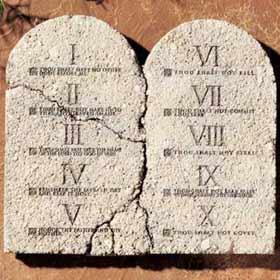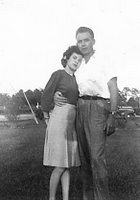Separating Church & State... With a crowbar
Congress shall make no law respecting an establishment of religion, or prohibiting the free exercise thereof; or abridging the freedom of speech, or of the press; or the right of the people peaceably to assemble, and to petition the government for a redress of grievances.
-First Amendment, U.S. Constitution
 Just recently it was decided that the monument of the ten commandments on the Capitol grounds in Austin, TX will be allowed to stay. Conversely it was ordered removed in other cases in other places. Personally I think this was done to allow the Supreme Court to do some backpedaling in the future, but that's just me.
Just recently it was decided that the monument of the ten commandments on the Capitol grounds in Austin, TX will be allowed to stay. Conversely it was ordered removed in other cases in other places. Personally I think this was done to allow the Supreme Court to do some backpedaling in the future, but that's just me.Between the commandment issues and the phrase "under God" in the Pledge I have heard the words "separation of church and state" shouted from the proverbial mountaintops, not to mention my TV.
I've heard of separation of church and state all my life. I never thought about it much. Basically I was given to understand that it meant the government couldn't tell me how to, or to Whom I had to pray (or even if I had to pray at all for that matter) and that was good enough for me.
With all the furor over this so-called separation I decided to look it up for myself. I'm fairly certain that I hadn't really read the Constitution since my high school days of the 80's. I could not find it. Nowhere (and I mean NO-WHERE) does it say "separation of church and state". I put it up top just in case you don't believe me. As it turns out it says almost exactly what I thought it meant. The more I thought about it however, the more it kept nagging at me. The phrasing of "no law...Prohibiting the free exercise thereof" stuck in the back of my mind. Doesn't that suggest to you that the government (Congress in particular) can't tell you that you can't exercise your religious beliefs, ie a monument of say... The 10 commandments?
I'm not a religious man. God and I have an understanding, I ask for very little and He ensures that I get it. Overall I am against moving or removing monuments that have historical connotations, newer monuments not so much, but I have the troubling feeling that government coercion forcing the removal of displays with religious overtones is not the correct interpretation of the first amendment.
Labels: Political Opinion












1 Comments:
It is when the government is the one endorsing the religion. In these cases you are talking about the State has went out of their way to add a religious artifact in a religious, not historical context.
FYI the word gun is also never mentioned in the Constitution; neither is Jesus, God, Christian or Christianity.
I guess my point is that most people forget about the 1st part of that phrase: Congress shall make no law respecting an establishment of religion. I interpret that to mean that the government cannot make any laws based on Christian/Religious principles nor can it recognize on religion over another, then the rest of the phrase means that the Government cannot deny you from practicing the religion of your choice.
That basically means that personally you can hang up all the 10 commandment you want on your private property and that you may pray as many times as you want in the church of your choosing. And it should mean that Mormons can have more than one wife and Rastafarians can smoke weed but we know that is not the case. As with any part of the constitution it gives you rights up to the point where your rights start to infringe upon other people's rights and current laws which is exactly what the 10 commandments hanging in my courthouse or paid for by my tax dollars does.
Although I would have to say I completely agree with the Supreme Court in that when the 10 commandments are displayed in a historical context along with Hammurabi's code of laws or the Magna Carta then that is fine.
Post a Comment
<< Home